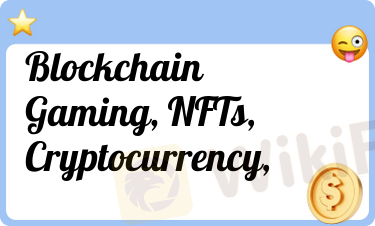
2025-02-12 03:02
業內Gaming and Cryptocurrency Intersections
1. Blockchain Gaming: Blockchain technology enables the creation of decentralized, transparent, and secure gaming platforms. Games like CryptoKitties and Decentraland use blockchain to create unique, tradable digital assets.
2. NFTs (Non-Fungible Tokens): NFTs are unique digital assets stored on a blockchain. They can represent in-game items, art, or collectibles. NFTs have become increasingly popular in gaming, with platforms like OpenSea and Rarible facilitating trading.
3. Cryptocurrency-based Gaming Platforms: Platforms like Steam, Xbox, and PlayStation have explored cryptocurrency-based payment systems. This allows gamers to purchase in-game items or subscriptions using cryptocurrencies like Bitcoin or Ethereum.
4. Esports and Cryptocurrency: Esports tournaments and teams have partnered with cryptocurrency companies to create new revenue streams. This includes sponsorship deals, cryptocurrency-based prize pools, and fan engagement platforms.
5. Virtual Real Estate: Decentraland and other platforms allow users to buy, sell, and trade virtual real estate using cryptocurrencies. This creates new opportunities for gamers, investors, and developers.
6. Gaming Tokens: Gaming tokens, like Enjin Coin (ENJ) and GameCredits (GAME), are designed specifically for gaming applications. They can be used for in-game purchases, rewards, or as a medium of exchange.
7. Decentralized Finance (DeFi) Gaming: DeFi gaming platforms, like Polygon (MATIC) and Solana (SOL), integrate decentralized finance concepts with gaming. This enables new types of gameplay, such as yield farming and liquidity mining.
Challenges and Opportunities
1. Regulation: The intersection of gaming and cryptocurrency raises regulatory questions. Governments and institutions must navigate the complexities of cryptocurrency and blockchain technology in gaming.
2. Security: The use of cryptocurrency and blockchain technology in gaming introduces new security risks. Platforms and developers must prioritize security to protect users' assets and data.
3. Scalability: As gaming and cryptocurrency adoption grows, scalability becomes a pressing issue. Platforms must be able to handle increased traffic and transactions while maintaining performance and security.
4. User Adoption: Educating users about the benefits and risks of cryptocurrency and blockchain technology in gaming is crucial for widespread adoption.
5. Innovation: The intersection of gaming and cryptocurrency enables new types of gameplay, business models, and revenue streams. Developers and entrepreneurs must continue to innovate and push the boundaries of what is possible.
The intersection of gaming and cryptocurrency is rapidly evolving, with new opportunities and challenges emerging regularly. As the space continues to grow, it's essential to stay informed about the latest developments and trends.
贊 0

Ayanfe436
交易商
熱門討論
業內
哎,现在明白不赌就是赢啊
行情分析
美元/加元技术面
技術指標
外汇技术分析之波浪理论
業內
[活動]論交易,贏取200元話費補貼
技術指標
EZ.Fury Kite是基于趋势指标MA进行判断
技術指標
指标派是什么?
市集分類

平臺

展會

代理商

招聘

EA

業內

行情

指標
Gaming and Cryptocurrency Intersections
 香港 | 2025-02-12 03:02
香港 | 2025-02-12 03:02
1. Blockchain Gaming: Blockchain technology enables the creation of decentralized, transparent, and secure gaming platforms. Games like CryptoKitties and Decentraland use blockchain to create unique, tradable digital assets.
2. NFTs (Non-Fungible Tokens): NFTs are unique digital assets stored on a blockchain. They can represent in-game items, art, or collectibles. NFTs have become increasingly popular in gaming, with platforms like OpenSea and Rarible facilitating trading.
3. Cryptocurrency-based Gaming Platforms: Platforms like Steam, Xbox, and PlayStation have explored cryptocurrency-based payment systems. This allows gamers to purchase in-game items or subscriptions using cryptocurrencies like Bitcoin or Ethereum.
4. Esports and Cryptocurrency: Esports tournaments and teams have partnered with cryptocurrency companies to create new revenue streams. This includes sponsorship deals, cryptocurrency-based prize pools, and fan engagement platforms.
5. Virtual Real Estate: Decentraland and other platforms allow users to buy, sell, and trade virtual real estate using cryptocurrencies. This creates new opportunities for gamers, investors, and developers.
6. Gaming Tokens: Gaming tokens, like Enjin Coin (ENJ) and GameCredits (GAME), are designed specifically for gaming applications. They can be used for in-game purchases, rewards, or as a medium of exchange.
7. Decentralized Finance (DeFi) Gaming: DeFi gaming platforms, like Polygon (MATIC) and Solana (SOL), integrate decentralized finance concepts with gaming. This enables new types of gameplay, such as yield farming and liquidity mining.
Challenges and Opportunities
1. Regulation: The intersection of gaming and cryptocurrency raises regulatory questions. Governments and institutions must navigate the complexities of cryptocurrency and blockchain technology in gaming.
2. Security: The use of cryptocurrency and blockchain technology in gaming introduces new security risks. Platforms and developers must prioritize security to protect users' assets and data.
3. Scalability: As gaming and cryptocurrency adoption grows, scalability becomes a pressing issue. Platforms must be able to handle increased traffic and transactions while maintaining performance and security.
4. User Adoption: Educating users about the benefits and risks of cryptocurrency and blockchain technology in gaming is crucial for widespread adoption.
5. Innovation: The intersection of gaming and cryptocurrency enables new types of gameplay, business models, and revenue streams. Developers and entrepreneurs must continue to innovate and push the boundaries of what is possible.
The intersection of gaming and cryptocurrency is rapidly evolving, with new opportunities and challenges emerging regularly. As the space continues to grow, it's essential to stay informed about the latest developments and trends.
贊 0
我也要評論
提問
0條評論

還沒人評論,趕緊搶佔沙發

提問
還沒人評論,趕緊搶佔沙發